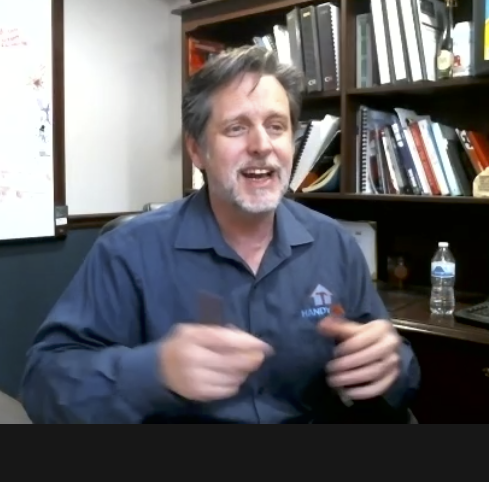Based in Farmington, Michigan, HandyPro provides professional handyman services to residential and commercial clients, along with home modifications for aging and people with disabilities. Founders Keith and Debra Paul also operate HandyPro International, a franchisor with locations in Texas, Florida, Ohio, Indiana and Washington D.C. In 2020 HandyPro brought in about $2 million in revenue, with franchisees generating another $5 million. To further scale the company, Keith Paul entered the System for Integrated GrowthSM (SIG) program.
Recruiting skilled craftsmen is HandyPro’s No. 1 challenge. “It’s a dying breed,” explains Paul, noting that the average age of a licensed plumber in the United States is 60. “In 2008 when we posted a help-wanted ad, we might get 50 resumes; now we’re lucky to get three responses.”
Among deliverables to bolster HandyPro’s recruiting efforts, SIG specialists provided:
- Best practices and new options for attracting employees, such as networking with various organizations, leveraging Google ad words and creating a more robust presence on LinkedIn.
- An analysis of HandyPro’s recruiting efforts compared with two key competitors.
- Suggestions for strengthening job postings, such as emphasizing HandyPro’s cutting-edge technology (which includes a new communications and booking app similar to Uber.com), flexible scheduling and career advancement opportunities.
- Improving the company’s rating on Indeed.com, a website where former and current employees anonymously review employers. (The researchers had found a negative review about HandyPro that was actually about a different company.)

“The SIG experts didn’t tell us what to do,” Paul says. “Instead, they gave us a great list of options to consider. We identified some that wouldn’t work and others we should start on right away.” For example, Paul crafted a package to clearly communicate why HandyPro is a great place to work, including website testimonials and videos about its team culture.
Paul is also highlighting “Tools for Success,” an internal training program that enables employees to gain skills and earn a higher commission. “We’ve taken the program up a notch, raising the bar on requirements,” he says. “We’ve also upgraded it to include a ‘HandyPro Certified Handyman Program’ to brand it more closely with our company.” Craftmen’s certification will be displayed on their security badges and picture at the company office, and the program will be available for franchisees as well.
In networking efforts, Paul has partnered with the Detroit Training Institute of Technology (DTIT) to offer a portion of HandyPro’s training program as a state-certified course. The focus will be on how to run a successful handyman business, from attracting customers to handling complaints — a project that could help raise professionalism in the industry, Paul says.
Another direct result of his SIG engagement, Paul is revamping HandyPro’s compensation plan, which had been structured as full commission. New recruits were often hesitant, concerned about how much money they could make. Now under the new system, recruits begin with a $600 weekly salary and a small commission. “When they prove they can do good work, they’re eligible to move to full commission if they wish to,” Paul says. The new system appears to be a hit, and two recent hires opted to go on full commission within 2-3 weeks of joining the firm.
Aside from recruiting, Paul also asked the SIG team to identify challenges he should expect to face in different stages of HandyPro’s growth. Using industry data, SIG specialists created organizational charts to show what kind of infrastructure and expertise HandyPro would need once it reached revenue of $8.5 million and $30 million.
“Having a picture of what our future company should look like gives me clarity about the people we’re going to need to bring on — and what we need to budget for,” Paul says. “I think I needed this clarity more than anything else, and now I can pass it on to our team.”
Paul also participated in an “aftercare” segment of SIG, where participants have monthly phone calls with their team leader over a 90-day period to discuss implementation efforts. Giving the calls a hearty thumbs-up, Paul says: “They not only helped me stay on track, but also helped me coach our franchisees to be more accountable.”
“I’ve never been part of something like this with such high-caliber experts,” he adds, referring to the overall SIG engagement. “As a result, I think we’ll reach our growth goals faster — and with less headaches. The engagement definitely saved us an entire year; we might even be able to reach our five-year revenue goal in two or three years.”
Copyright © 2021 Edward Lowe Foundation
